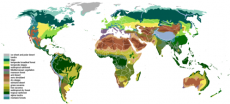

Altitude and distance inland are important influences too. Temperatures fall by about half a degree for every 100 metres increase in altitude. As a result, tough grasses quickly replace trees on higher mountain slopes. In the USA and in Asia, inland areas isolated from the sea suffer from low rainfall because winds blowing off the oceans quickly lose moisture- especially if the air passes over high mountains. The drier lands found further in land are said to be in a ‘rain shadow’. On a smaller scale, the same effect is found in Great Britain.
Finally, geology has an influence. Limestone bedrock creates dry soil conditions because percolating rainwater passes through it relatively easily. In the UK, trees are rarely found in limestone areas. In the tropical forest, deciduous trees may replace evergreens where limestone is found.
Precipitation is more likely in some areas than others. Where air is forced to rise (low pressure) rainfall is common all year round and forests grow. Where air sinks (high pressure) there is little of no rainfall and deserts form in between rainfall and deserts form. In between we have areas that have wet and dry seasons like savannahs.
The biosphere acts as a life support system, providing a wide range of goods and services. The biosphere acts as a life-support system for the planet, helping to regulate the composition of the atmosphere, maintaining soil health and regulating the hydrological water cycle.
Water cycle- trees and other plants slow the flow of rainwater to rivers acting as a natural flood control. They slow down the speed at which it travels to the nearest river.
Soil health- dead leaves and plants add nutrients to the soil. Insects and animals burrow, helping the soil breathe. Healthy soils require constant inputs of new nutrients from falling leaves and rotting plant remains. In the absence of human interference, nutrients such as nitrogen and potassium are constantly recycled.
Plants absorb carbon dioxide (the main climate altering gas) and produce oxygen instead. The biosphere is an important carbon store.
What goos and services does the biosphere provide us?
Food- when population numbers are low, natural ecosystems can be sustainably harvested, for example through berry and fruit picking.
Medicines- many naturally occurring substances act as medicines and remedies. For example, quinine is a plant extract found in the tropical rainforest.
Raw materials- the biosphere provides raw materials for industrial activities. The most important of these is wood for the construction of houses and boats.
Services- the biosphere helps humans conduct business in varying ways. For example, it provides the natural resources needed for ecotourism and many outdoor leisure activities.
What food can people get from the biosphere?
Fish and meat are part of the biosphere
Natural vegetation can be replaced with crops like wheat and rice.
Sustainable harvesting of fruits, berries and nuts.
What raw materials can people get from the biosphere?
Timber is a vital resource
In Hong Kong, bamboo is used for scaffolding
Rubber comes from trees and makes tyres
Nature provides resources for ecotourism
Wood pulp makes paper
Mangrove trees are a natural food defence
What medicine can people get from the biosphere?
Quintile comes from bark and has been used fas a painkiller and malaria treatment
The periwinkle plant is used to treat leukaemia and Hodgkin’s disease
Image- https://en.wikipedia.org/wiki/Biome

0 Comment:
Be the first one to comment on this article.